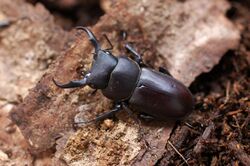Biology:Dorcus rectus
From HandWiki
Short description: Species of beetle
| Dorcus rectus | |
|---|---|

| |
| Scientific classification | |
| Domain: | Eukaryota |
| Kingdom: | Animalia |
| Phylum: | Arthropoda |
| Class: | Insecta |
| Order: | Coleoptera |
| Family: | Lucanidae |
| Genus: | Dorcus |
| Species: | D. rectus
|
| Binomial name | |
| Dorcus rectus (Motschulsky, 1857)
| |

(a) Male mandibles with two pairs of teeth (arrows). (b) Male mandibles with one pair of teeth (arrows). (c) Male mandibles with no teeth. (d) Female mandibles with one pair of teeth (arrows).[1]
Dorcus rectus, the little stag beetle, is a species of beetles in the family Lucanidae. It can be found in China (Liaoning), Korea, Japan , Taiwan and Russia .[2][3] These beetles have a distinctive red shell that separates them from Dorcus curvidens. Males of this species have been observed to have mandible trimorphism,[1] a characteristic that has only been described in two species of Lucanidae—with the other one being Odontolabis cuvera—"and a small number of other invertebrates" as of 2017.[4] The mandibles are used by males as weapons.[4]
References
- ↑ 1.0 1.1 Iguchi, Yutaka (2013). "Male mandible trimorphism in the stag beetle Dorcus rectus (Coleoptera: Lucanidae)". European Journal of Entomology 110 (1): 159–163. doi:10.14411/eje.2013.022.
- ↑ Catalogue of Life: 2019 Annual Checklist
- ↑ Matsuoka, Norimasa; Hosoya, Tadatsugu; Hamaya, Tsuyoshi; Abe, Azuma (February 1998). "Phylogenetic Relationships Among Four Species of Stag Beetles (Coleoptera: Lucanidae) Based on Allozymes". Comparative Biochemistry and Physiology Part B: Biochemistry and Molecular Biology 119 (2): 401. doi:10.1016/S0305-0491(97)00366-0. https://www.sciencedirect.com/science/article/abs/pii/S0305049197003660. Retrieved 31 December 2021.
- ↑ 4.0 4.1 Matsumoto, Keita; Knell, Robert (December 1, 2017). "Diverse and complex male polymorphisms in Odontolabis stag beetles (Coleoptera: Lucanidae)". Scientific Reports 7 (1): 16733. doi:10.1038/s41598-017-17115-5. PMID 29196728. Bibcode: 2017NatSR...716733M.
Wikidata ☰ Q7884363 entry
 |

